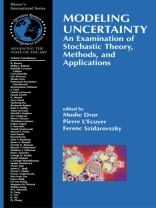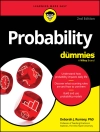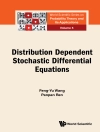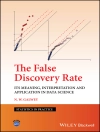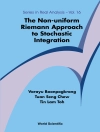Modeling Uncertainty: An Examination of Stochastic Theory, Methods, and Applications, is a volume undertaken by the friends and colleagues of Sid Yakowitz in his honor. Fifty internationally known scholars have collectively contributed 30 papers on modeling uncertainty to this volume. Each of these papers was carefully reviewed and in the majority of cases the original submission was revised before being accepted for publication in the book. The papers cover a great variety of topics in probability, statistics, economics, stochastic optimization, control theory, regression analysis, simulation, stochastic programming, Markov decision process, application in the HIV context, and others. There are papers with a theoretical emphasis and others that focus on applications. A number of papers survey the work in a particular area and in a few papers the authors present their personal view of a topic. It is a book with a considerable number of expository articles, which are accessible to a nonexpert – a graduate student in mathematics, statistics, engineering, and economics departments, or just anyone with some mathematical background who is interested in a preliminary exposition of a particular topic. Many of the papers present the state of the art of a specific area or represent original contributions which advance the present state of knowledge. In sum, it is a book of considerable interest to a broad range of academic researchers and students of stochastic systems.
Tabella dei contenuti
Chapter 1. Professor Sidney J. Yakowitz.- Chapter 2. Stability of Single Class Queueing Networks.- Chapter 3. Sequential Optimization Under Uncertainty.- Chapter 4. Exact Asymptotics for Large Deviation Probabilities, with Applications.- Chapter 5. Stochastic Modelling of Early HIV Immune Responses Under Treatment by Protease Inhibitors.- Chapter 6. The impact of re-using hypodermic needles.- Chapter 7. Nonparametric Frequency Detection and Optimal Coding in Molecular Biology.- Chapter 8. An Efficient Stochastic Approximation Algorithm for Stochastic Saddle Point Problems.- Chapter 9. Regression Models for Binary Time Series.- Chapter 10. Almost Sure Convergence Properties of Nadaraya-Watson Regression Estimates.- Chapter 11. Strategies for Sequential Prediction of Stationary Time Series.- Chapter 12. The Birth of Limit Cycles in Nonlinear Oligopolies with Continuously Distributed Information Lag.- Chapter 13. A Differential Game of Debt Contract Valuation.- Chapter 14. Huge Capacity Planning and Resource Pricing for Pioneering Projects.- Chapter 15. Affordable Upgrades of Complex Systems: A Multilevel, Performance Based Approach.- Chapter 16. On Successive Approximation of Optimal Control of Stochastic Dynamic Systems.- Chapter 17. Stability of Random Iterative Mappings.- Chapter 18. ‘Unobserved’ Monte Carlo Methods for Adaptive Algorithms.- Chapter 19. Random Search Under Additive Noise.- Chapter 20. Recent Advances in Randomized Quasi-Monte Carlo Methods.- Chapter 21. Singularly Perturbed Markov Chains and Applications to Large-Scale Systems under Uncertainty.- Chapter 22. Risk–Sensitive Optimal Control in Communicating Average Markov Decision Chains.- Chapter 23. Some Aspects of Statistical Inference in a Markovian and Mixing Framework.- Chapter 24. Stochastic Ordering of Order Statistics II.- Chapter 25. Vehicle Routing with Stochastic Demands: Models & Computational Methods.- Chapter 26. Life in the Fast Lane: Yates’s Algorithm, Fast Fourier and Walsh Transforms.- Chapter 27. Uncertainty Bounds in Parameter Estimation with Limited Data.- Chapter 28. A Tutorial on Hierarchical Lossless Data Compression.- Chapter 29. Eureka! Bellman’s Principle of Optimality is valid!- Chapter 30. Reflections on Statistical Methods for Complex Stochastic Systems.
Circa l’autore
Moshe Dror joined the Eller College of Management in 1990 and previously taught at Ben Gurion University. He earned his Ph D in Management Science from the University of Maryland in 1983. His research focuses on cooperative game theory, cost allocation in inventory and supply chain management, applied combinatorial optimization in transportation, logistics and manufacturing and intelligent solution systems for operations scheduling.
Pierre L’Ecuyer is a Professor in the Departement d’Informatique et de Recherche Operationnelle at the Universite de Montreal, since 1990. He holds the Canada Research Chair in Stochastic Simulation and Optimization since 2004 and an Inria International Chair (at Inria-Rennes, France) for 2013–2018. He is a member of the CIRRELT and GERAD research centers, in Montreal.
Ferenc Szidarovszky is a senior researcher with the Ridgetop Group Inc. working on theoretical issues concerning reliability, robustness, optimal maintenance and replacement policies and prognostics in complex systems. In addition to these industrial applications he also performs research in systems theory, especially in dynamic economic systems. He has performed research in very broad fields of applied mathematics including numerical analysis, optimization, multi-objective programming, game theory, dynamic systems, applied probability and their applications in industrial processes, environment, water resources management, economics, and computer network security, among others. He currently has a professor position with the Applied Mathematics Department of the University of Pecs, Hungary, where his duty is a one week long intensive Game Theory Course every year.
